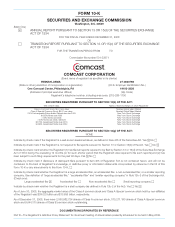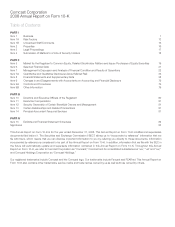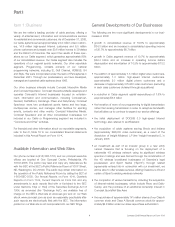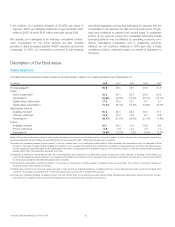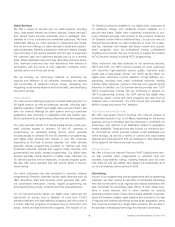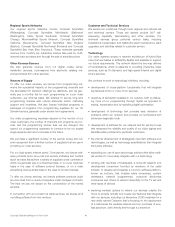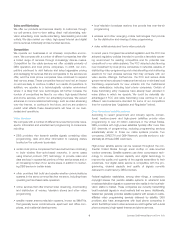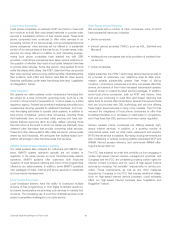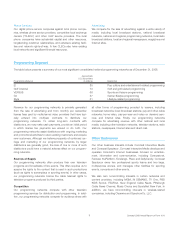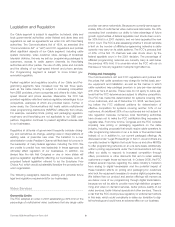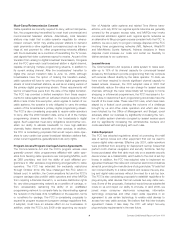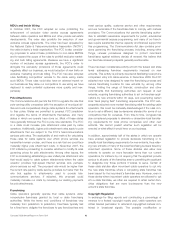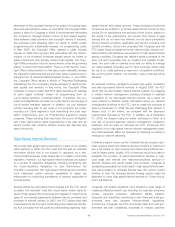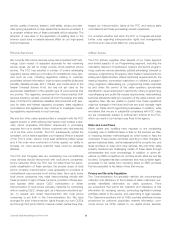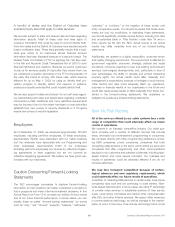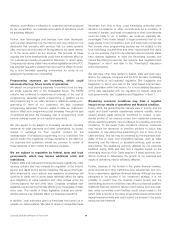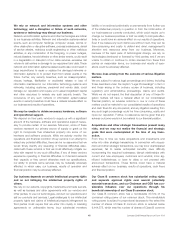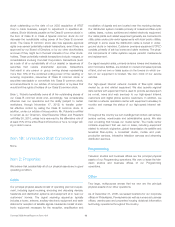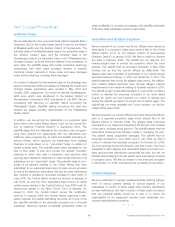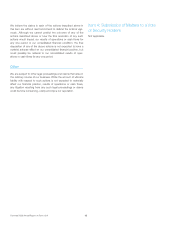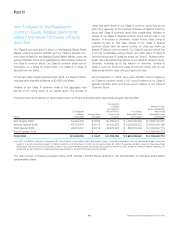Comcast 2008 Annual Report Download - page 11
Download and view the complete annual report
Please find page 11 of the 2008 Comcast annual report below. You can navigate through the pages in the report by either clicking on the pages listed below, or by using the keyword search tool below to find specific information within the annual report.Must-Carry/Retransmission Consent
Cable operators are currently required to carry, without compensa-
tion, the programming transmitted by most local commercial and
noncommercial television stations. Alternatively, local television
stations may insist that a cable operator negotiate for retrans-
mission consent, which may enable popular stations to demand
cash payments or other significant concessions (such as the car-
riage of, and payment for, other programming networks affiliated
with the broadcaster) as a condition of transmitting the TV broad-
cast signals that video customers expect to receive. As part of the
transition from analog to digital broadcast transmission, Congress
and the FCC gave each local broadcast station a digital channel,
capable of carrying multiple programming streams, in addition to
its current analog channel. After the broadcasters’ transition to
digital (the current transition date is June 12, 2009, although
broadcasters have the option of making the transition earlier),
cable operators will have to carry the primary digital programming
stream of local broadcast stations, as well as an analog version of
the primary digital programming stream. These requirements will
last for at least three years from the date of the digital transition.
The FCC has provided a limited exemption from these require-
ments for cable systems with an activated channel capacity of 552
MHz or less. Under this exemption, which applies to certain of our
cable systems, the operator is only obligated to carry the analog
version of the broadcaster’s primary digital programming stream.
The FCC is also considering proposals to require cable operators
to carry, after the 2009 transition date, some or all of the multiple
programming streams transmitted in the broadcaster’s digital
signal. Such expanded must-carry obligations would further con-
strain our ability to allocate bandwidth to more high-definition
channels, faster Internet speeds and other services. In addition,
the FCC is considering proposals that would require cable oper-
ators to carry certain low power broadcast television stations that,
under current regulations, generally lack must-carry rights.
Program Access/Program Carriage/License Agreements
The Communications Act and the FCC’s program access rules
generally prevent video programmers affiliated with cable oper-
ators from favoring cable operators over competing MVPDs, such
as DBS providers, and limit the ability of such affiliated pro-
grammers to offer exclusive programming arrangements to cable
operators. The FCC has extended the exclusivity restrictions
through October 2012. We have challenged this FCC action in
federal court. In addition, the Communications Act and the FCC’s
program carriage rules prohibit cable operators and other MVPDs
from requiring a financial interest in, or exclusive distribution rights
for, any video programming network as a condition of carriage, or
from unreasonably restraining the ability of an unaffiliated
programming network to compete fairly by discriminating against
the network on the basis of its nonaffiliation in the selection, terms
or conditions for carriage. The FCC is considering proposals to
expand its program access and program carriage regulations that,
if adopted, could have an adverse effect on our businesses. In
addition, under the FCC’s July 2006 order approving our acquis-
ition of Adelphia cable systems and related Time Warner trans-
actions, until July 2012 our regional sports networks are generally
covered by the program access rules, and MVPDs may invoke
commercial arbitration against such regional sports networks as
an alternative to filing a program access complaint with the FCC. In
addition, we are a party to program carriage disputes at the FCC
involving three programming networks (NFL Network, WealthTV
and Mid-Atlantic Sports Network). Adverse decisions in these
disputes could increase our costs and curtail our flexibility to
deliver services to our customers.
Leased Access
The Communications Act requires a cable system to make avail-
able up to 15% of its channel capacity for commercial leased
access by third parties to provide programming that may compete
with services offered directly by the cable operator. To date, we
have not been required to devote significant channel capacity to
leased access. However, the FCC adopted rules in 2007 that
dramatically reduce the rates we can charge for leased access
channels. Although the lower rates initially will not apply to home
shopping or infomercial programmers, the FCC has issued a fur-
ther notice to determine if such programming should also have the
benefit of the lower rates. These new FCC rules, which have been
stayed by a federal court pending the outcome of a challenge
brought by us and other cable operators and which also have
been blocked by the Office of Management and Budget, could
adversely affect our business by significantly increasing the num-
ber of cable system channels occupied by leased access users
and by significantly increasing the administrative burdens and
costs associated with complying with such rules.
Cable Equipment
The FCC has adopted regulations aimed at promoting the retail
sale of set-top boxes and other equipment that can be used to
receive digital video services. Effective July 2007, cable operators
were prohibited from acquiring for deployment set-top boxes that
perform both channel navigation and security functions. Set-top
boxes purchased after that date must rely on a separate security
device known as a CableCARD, which adds to the cost of set-top
boxes. In addition, the FCC has adopted rules to implement an
agreement between the cable and consumer electronics industries
aimed at promoting the manufacture of plug-and-play TV sets that
can connect directly to a cable network and receive one-way ana-
log and digital video services without the need for a set-top box.
The FCC is also considering proposals to establish regulations for
plug-and-play retail devices that can access two-way cable serv-
ices. Some of the proposals, if adopted, would impose substantial
costs on us and impair our ability to innovate. In April 2008, we
joined major consumer electronics companies, information
technology companies and other major cable operators in an
agreement to use certain technology to enable retail devices to
access two-way cable services. We believe that this inter-industry
agreement makes it less likely the FCC will adopt two-way
plug-and-play requirements in the near future.
9Comcast 2008 Annual Report on Form 10-K

